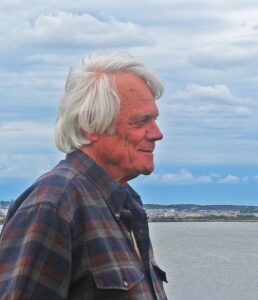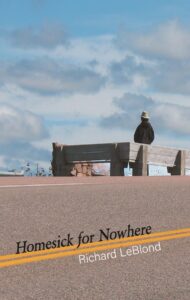I’ve never been a fan of most travel writing. The older I get, the more comfortable my couch, the more set my ways, the more satisfied I am to stay right where I am. But I’m engrossed by Henry Thoreau’s writing about his wanderings around Concord and Cape Cod because the man is such a part of the narrative. Richard LeBlond, too, invests himself in Homesick for Nowhere, a collection of pieces published in January (Eastover Press, 2023). It’s his first book, and he’s in his early 80s.

LeBlond explains the book’s title as a translation of a Yup’ick Eskimo phrase meaning “to be at one with the universe, no matter where one might be physically.” In this volume he travels from North Carolina to Montana to the Pacific Northwest to Nova Scotia, Newfoundland, and Labrador, and to Cape Cod. He also travels through time, growing from a nine-year-old boy with a paper route to an old man concerned with biopsies and the state of his prostate. By the end of the book, you feel that you know the man.
Some local readers who go back far enough do know LeBlond. He lived on the Cape from the late ’60s almost continuously until 1990. A major force for conservation, he worked for the Cape Cod National Seashore and the Center for Coastal Studies. He wrote a nature column that appeared in the Provincetown Advocate, among other newspapers.
The Cape figures prominently in one section of the book: “Living on Sand.” LeBlond references our local fauna: piping plovers, spadefoot toads, terns, alewives, dolphins, and whip-poor-wills. He writes about a weasel in a dune shack, describes the sound of the surf and foghorns and fishing boats off the back shore, and even mentions local celebrity Alice Brock of “Alice’s Restaurant” fame.
I found the writing about other places more powerful. In Oregon, he says the Zumwalt Prairie wildflowers look as though “some sloppy god had spilled his paints.” He could observe Mount Hood for only a few days of the year, “when the clouds lifted their soggy skirts.”
The section of Homesick for Nowhere set in the Canadian Atlantic appealed to me. It is similar to Cape Cod in some ways — perhaps an earlier version of our current environment. At the same time, it is wildly different. LeBlond is a naturalist, specifically a botanist, and he describes the natural history of the region. Newfoundland is “Nature’s great experiment … where the sea reclaims the rock one grain at a time.” Among the descriptions of plants and animals is LeBlond’s encounter with a black bear. It conjures one of the best sentences in the book: “The bear was doing what a dozen gurus had failed to do: bring me to total and continuous focus in the present.”

But it is LeBlond’s focus on the culture of the region (“French fishermen, Celtic musicians, good restaurants”) that I most enjoyed. The locals shrug in the face of their stormy weather and grueling ferry travel. LeBlond describes them in their various haunts. One of the bars (termed “lounges” up there) “had all of the glamour and none of the pretensions of an unlit back alley.” The behavior of the locals can only be called joyous, especially when primed with alcohol: one lounge is particularly busy after a funeral because “death has no equal for unstopping the taps.” Newfoundland’s rum is aptly called “screech,” and “it is better chugged than sipped.”
LeBlond’s lifelong interest in food is abundantly indulged in these pages. The delights of one seafood chowder contrast with another, called “brewis,” which is “almost edible.” LeBlond consumes plenty of wild game, including seal: “My gag reflex lurked in the background but never came into play.” Salt beef was more traditional, but “the last bite could be chewed all afternoon if one so desired.”
The mix of food, people, natural history, travel, and memoir make Homesick for Nowhere a companionable read. I counted 57 pieces in this collection, some only one page long. It could fairly be called a hodgepodge. Not all the pieces land with the same effect, but the best of them will stay with the reader for a very long time. Richard LeBlond has spared me the challenges of hitting the road but provided what seem almost like my own memories. He is good company.
